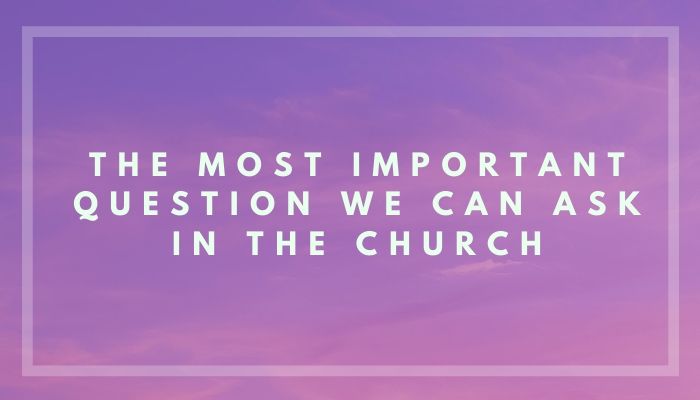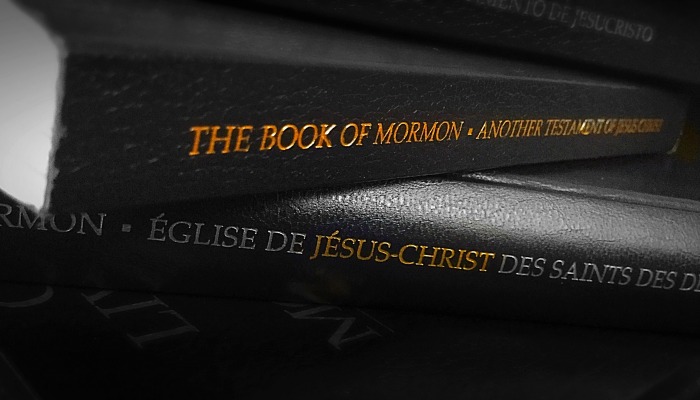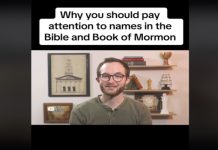
By nature, I’ve always been an inquisitive person. My mind is an ever-churning pool of questions about everything. It causes me to overanalyze things fiercely, but I’m going to level with you: it’s worth it because it also means that I’m FANTASTIC at creating “Would you rather…?” questions. And what else really matters in this life?!
But in all seriousness, over the years, I’ve had hundreds — probably thousands — of questions related to the Church. I’ve written about a lot of them and received answers to even more. Yet there is one question I continue to struggle with, and I’ve realized it may go with me throughout this life: God loves each of His children and wants them to be happy, so why doesn’t He condone the exercise of homosexual relationships?
That question isn’t uncommon — it’s one that so many of us have because we love our LGBTQ+ brothers and sisters so much. But I realized something the other day: while that question is completely valid, it’s not the one that I need answered to prove whether this is God’s Church and whether it’s actually doing His will.
Because that question — the one that matters more than any other — was already answered for me a long time ago.
The only question I need to have an answer to is whether the Book of Mormon is actually the word of God.
Looking Beyond the Mark
 Jacob, a Book of Mormon prophet, talks in Jacob 4 about a group of people who had fallen away from the gospel because they “look[ed] beyond the mark.”
Jacob, a Book of Mormon prophet, talks in Jacob 4 about a group of people who had fallen away from the gospel because they “look[ed] beyond the mark.”
In other words, these people got hung up on all of their questions — questions that were probably important and legitimate, but ultimately were not imperative for them to have answers to at that time. Because they were so focused on a comparatively small speck of the gospel, they weren’t able to see the big picture.
In Satan’s big bag of tricks and deceptions and lies, I think this is his greatest and most crafty: his ability to get us to look beyond the mark. It’s how he gets the best of the best, the most faithful, to question everything they know and sometimes, unfortunately, to lose their faith entirely.
He can get us SO focused on one question that we forget the question that precedes it. The ultimate question that answers all others is “Is the Book of Mormon true?” because if it is, that means that God the Father is real, Jesus Christ is His Son, and that Joseph Smith was truly a prophet of God who translated an ancient record. If the Book of Mormon is true, it means that The Church of Jesus Christ of Latter-day Saints is God’s Church on the earth and is led by Jesus Christ Himself.
And if Jesus Christ is really the head of this Church, it means that the prophet is His mouthpiece and is telling us Christ’s will. And Christ’s will is always better than our own — even when it doesn’t make sense to us right now.
So the question isn’t “Why Polygamy?” or “Why can only men be ordained to the priesthood?” or any other number of questions, valid as they are. It’s “Is the Book of Mormon true?” because the answer to that question supersedes every other.
Proving the Church’s Validity
 I’ve seen so many people I admire fall away from the gospel because they start to base the Church’s truth on the wrong principle. For instance, they tie “Is the Church true?” to their questions about polygamy, homosexuality, priesthood, etc. But none of those things prove the Church’s legitimacy; the Book of Mormon — and only the Book of Mormon — does that.
I’ve seen so many people I admire fall away from the gospel because they start to base the Church’s truth on the wrong principle. For instance, they tie “Is the Church true?” to their questions about polygamy, homosexuality, priesthood, etc. But none of those things prove the Church’s legitimacy; the Book of Mormon — and only the Book of Mormon — does that.
Tying “Is the Church true?” to any question other than “Is the Book of Mormon the word of God?” is like looking for answers to your biology homework in your English textbook. You will not find the answers to your questions, because that’s not where they are located. If the adversary can get us to base our testimonies on an arbitrary question (however valid, concerning, or heart-wrenching it may be) that doesn’t actually prove the Church’s legitimacy, he’s getting us to look beyond the mark.
When we don’t find answers to those questions — and sometimes we won’t in this life — we walk away, forgetting that those questions are not the question that validates whether or not The Church of Jesus Christ of Latter-day Saints is Christ’s Church. So many people abandon their faith not because they are bad or unfaithful, but because they weren’t asking the question needed to find the answer they were looking for.
The Whole Reason for Our Mortal Experience
 There will always be things in the gospel that don’t make sense to us — and that’s by divine design.
There will always be things in the gospel that don’t make sense to us — and that’s by divine design.
If God gave us answers to all of our questions, we wouldn’t be exercising faith. Faith has no purpose if we understand everything. If we understand everything, we don’t need faith because we can prove our claim — and if we did that, everyone would believe in God not because they actually love Him and truly want to be like Him, but because there is solid proof that He is there and that we’ll be rewarded for following Him.
Hence, there are questions in this life that may go unanswered, and that is where faith comes in — the faith to hold on when we don’t understand everything. God does not and will not give us everything — every answer to our question, every blessing we wish for — but He gives us enough. The “enough” of our testimonies is answering our question of whether the Book of Mormon is true. If we have that knowledge, then we have enough, no matter what questions may arise — and arise they will.
In his legendary talk “Safety for the Soul,” Jeffrey R. Holland examined that very principle:
“In Lehi’s dream an already difficult journey gets more difficult when a mist of darkness arises, obscuring any view of the safe but narrow path his family and others are to follow. It is imperative to note that this mist of darkness descends on all the travelers—the faithful and the determined ones (the elect, we might even say) as well as the weaker and ungrounded ones.
The principal point of the story is that the successful travelers resist all distractions, including the lure of forbidden paths and jeering taunts from the vain and proud who have taken those paths. The record says that the protected ‘did press their way forward, continually [and, I might add, tenaciously] holding fast’ to a rod of iron that runs unfailingly along the course of the true path. However dark the night or the day, the rod marks the way of that solitary, redeeming trail” (emphasis added).
Just like the mist of darkness fell on everyone, the reality is that throughout this life, we will all have our faith called into question due to various concerns we have regarding the Church. But if we hold to the iron rod — a.k.a, the Book of Mormon — then we can withstand any question, any temptation, any problem because we will understand that ultimately, our questions are secondary to the witness of that book’s truthfulness. It’s only when we let go of the rod, or forget the fact that the Church’s validity and truthfulness are tied directly to the Book of Mormon, that we wander and fall away from the path.
There will always be questions, but the Church’s validity — its truthfulness — come down to one question and one question only: Is the Book of Mormon true?





